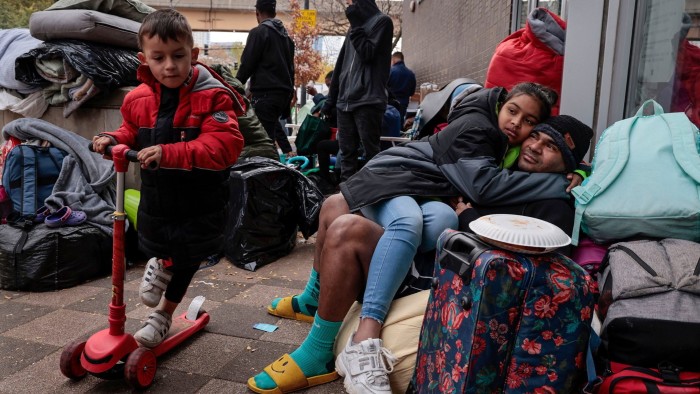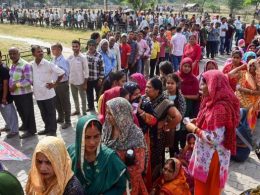Unlock the White House Watch newsletter for free
Your guide to what the 2024 US election means for Washington and the world
The writer is a contributing columnist, based in Chicago
On Christmas Eve last year, I visited Luis and his wife, Maria, sleeping on the floor of Chicago’s O’Hare airport. They were two of the 51,000 migrants shipped by Texas Republicans to the Democratic city of Chicago as political pawns in the US presidential campaign.
This Christmas Eve, they have their own apartment, jobs and a car. Luis has a bank account, a debit card, a social security card and a work permit. Like many of those bussed north as part of Texas governor Greg Abbott’s plan to “bring the border” to distant Democratic cities, these two twenty-something Latin American immigrants (whose names have been changed to protect them) have already been absorbed into US life. Many cities like Chicago “have seemed to settle into a new normal” after the crisis of huge unexpected migrant arrivals last year, Muzaffar Chishti, senior fellow at the Migration Policy Institute, tells me.
The migrant shelter where the couple lived last year — and most others — have closed. Most of the former inhabitants have found housing (often two or three families per apartment) and work at legal or illegal jobs, or they have moved to states where they have friends or family. Many have applied for asylum — thinking they were on the yellow brick road to legal status in America.
But last month’s election has thrown many of those not born in the US — and even some who were — into panic. President-elect Donald Trump has promised “the largest deportation programme in American history”, beginning on “day one” of his new term. People like Luis and Maria could get caught in it, immigrant rights activists say.
It makes sense to be concerned, but Trump is “not king”, says Chishti. “The institutions of our democracy will still function . . . and there will be many impediments to his worst instincts.” Courts have backlogs so the administration may face big delays in obtaining a final order of removal on someone, he says. Even if the administration can locate people who may be living under the radar, “you can’t just pick someone up and drop them in Venezuela without Venezuela’s co-operation”, he points out.
An easy target for Trump might be the 1.4mn people who have already had a final order of removal but never left the country, those serving criminal sentences and those in the country less than two years. But he notes there are legal impediments that could slow or prevent their deportation too.
“There will be large-scale, dramatic enterprises of deportation, there will be a big splash . . . but to believe that 11mn people will be deported is simply not possible,” he concludes. “At the end of the day, there will be a lot of spectacle without meaningful outcome, but these spectacles create a lot of fear and anxiety and pain.”
Eréndira Rendón, vice-president of immigrant justice at The Resurrection Project, a Chicago community group that helps migrants, is trying to educate her community to “know your rights”. Her own parents are long-term undocumented immigrants who could be vulnerable. She tells them “don’t leave the garage door open any more, so [immigration agents] can’t just enter without a warrant”. And even if officials have a valid warrant, still don’t let them enter; if necessary have the named person step out of the house without letting agents in where they could round up others as well.
Activists caution that migrants in Chicago are vulnerable despite the city’s “sanctuary city” law, which prohibits local officials from helping federal immigration agents enforce immigration law.
Nadav Shoked, expert on local government law at Northwestern University Pritzker School of Law, tells me the federal government doesn’t have enough staff to round up millions of immigrants, so they often rely on local police. In Chicago they can’t do that, “but if the administration wants to make a point about sanctuary cities, they could put together all their forces and hit the shelters and parks in Chicago — but the numbers won’t be what he’s hoping for”.
So how is Luis feeling this holiday — especially since he now lives, ironically, in Texas, which has a law banning sanctuary cities. “I’m not really worried — should I be?” he asks. Is he happy he came to the US, given the recent sharp rise in anti-immigrant sentiment, which many political experts credit for helping elect Trump? “Of course,” he chides, as though it’s a silly question. “I want to stay here for the rest of my life.”
Source link









